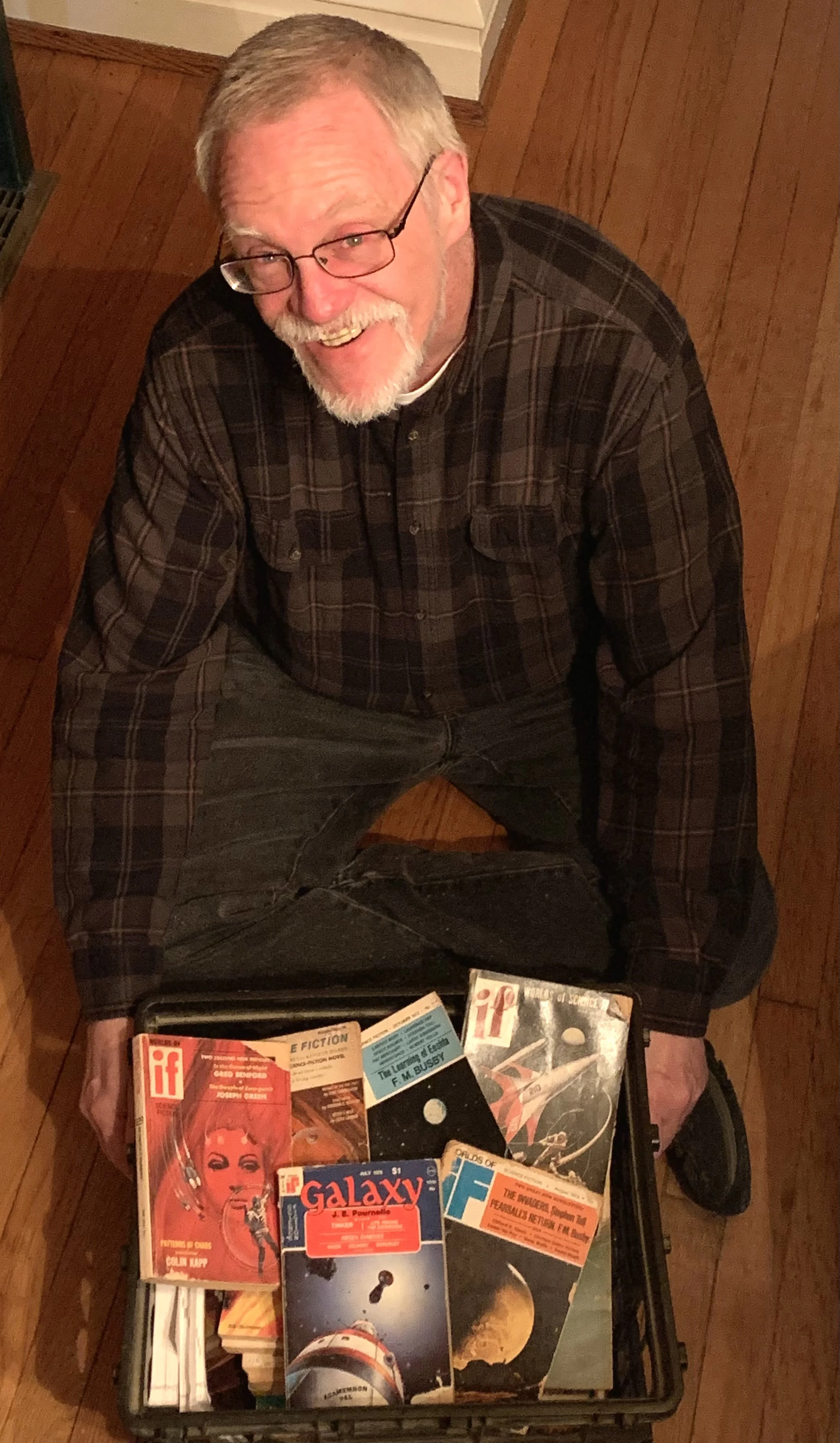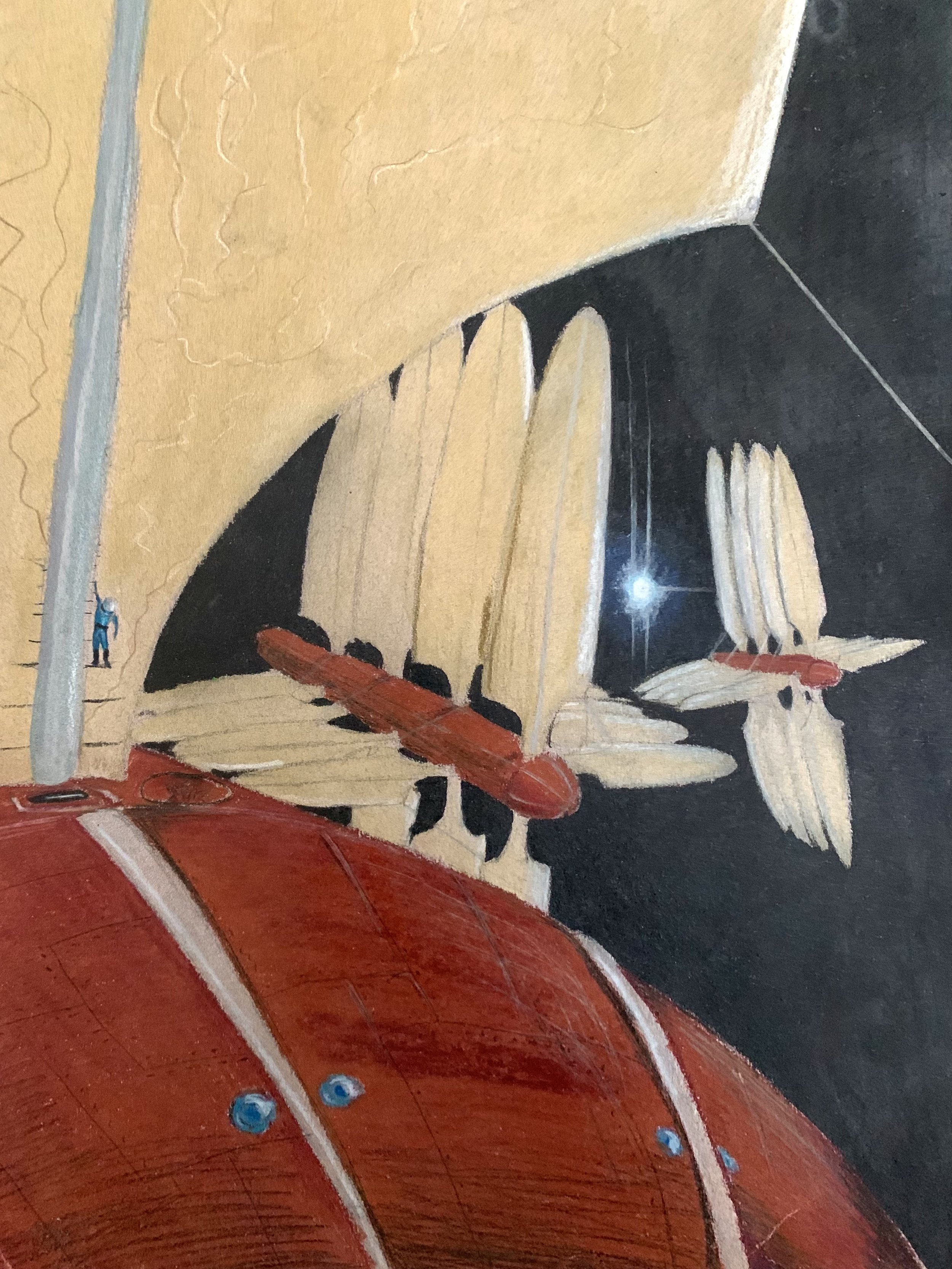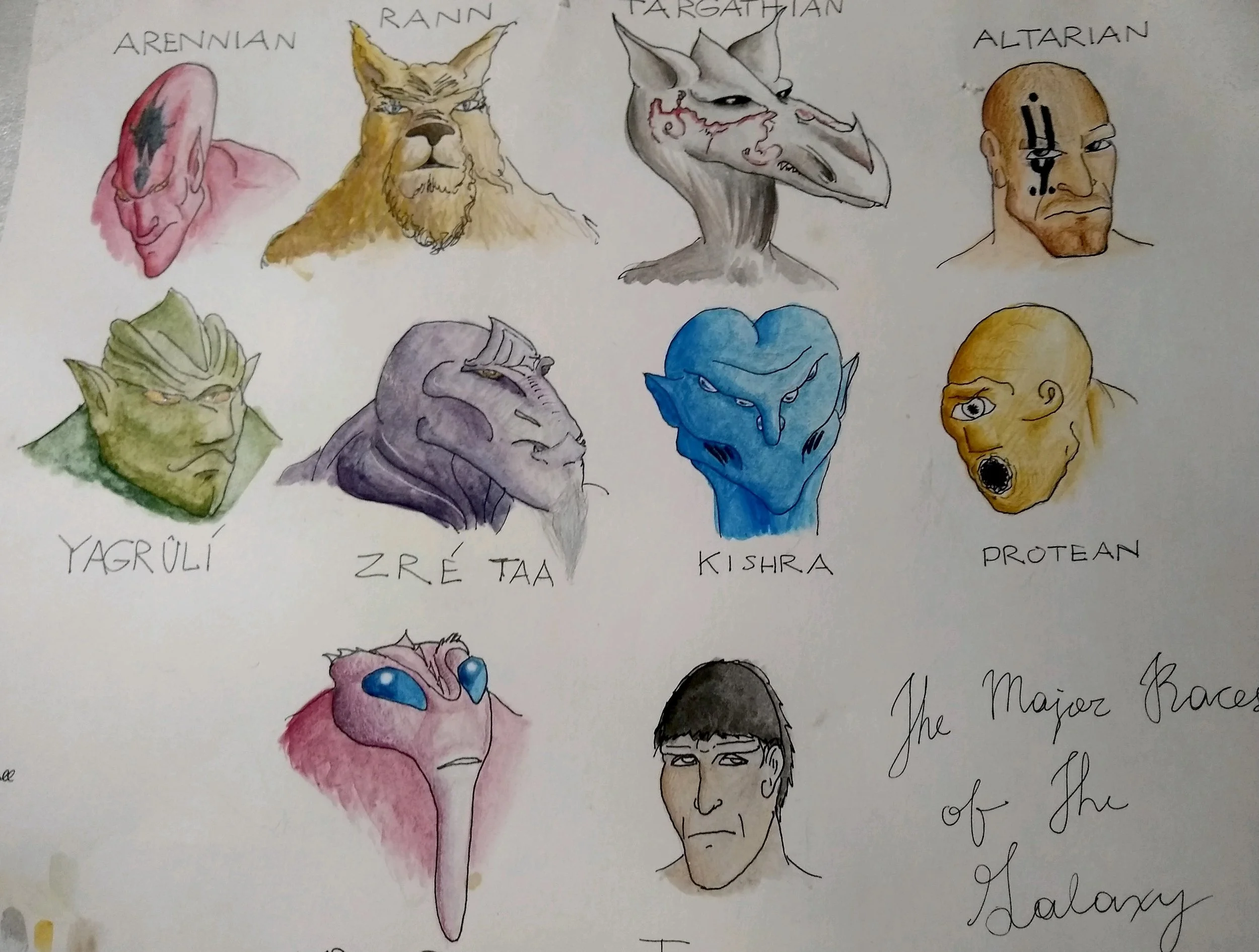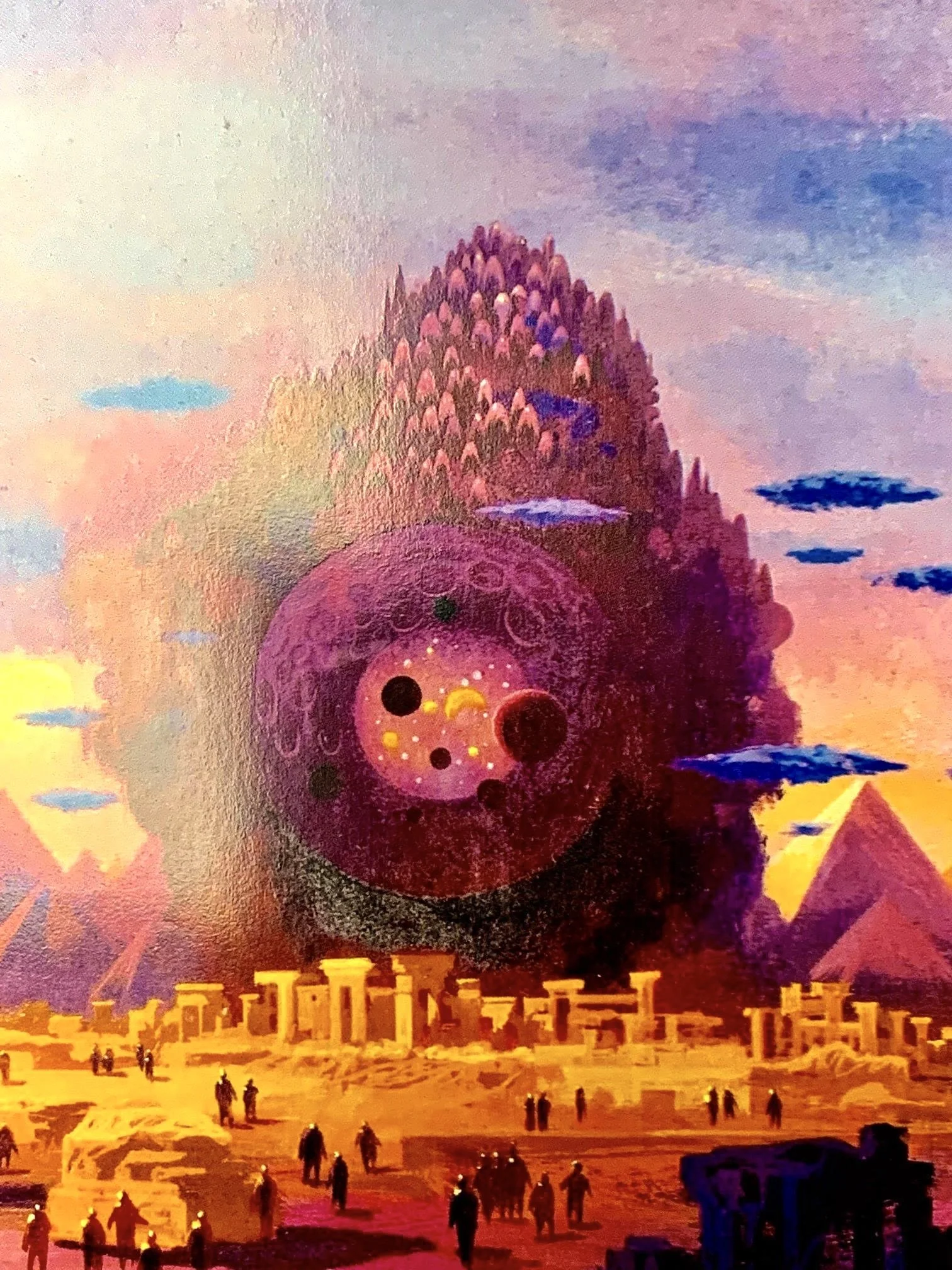A Paper Trail to the Stars
I found my husband cross legged at the bottom of the basement stairs with the dreamy, far away look of a twelve year old fighting dragons in his head – and winning. Then I saw the box. The box of legend. The box that had survived moves from his boyhood home, to a dingy city studio, to Michigan after the honeymoon, and back again to the old hometown to be hauled two more times to musty, cracked-walled city cellars before settling in under the basement stairs for the long haul. The box was part of us. It had survived.
We are moving. The dreaded word, “downsizing,” has finally escaped our lips. The nest is truly echoing with the emptiness. Nostalgia has set in. I am looking at cracked plates and old kiddy drawings with sudden and oh, so pathetic pathos. Everything is a metaphor of what went before. I am overwhelmed at times by the sudden, abrupt unearthing of long settled things. I feel like life will crumble if we move too many boxes and disturb the memories inside. They seem a fragile edifice up against the winds of change. So do I. It’s so odd a feeling.
My husband is not like me. He holds lightly to everything. He can wear two pairs of shoes ad infinitum. He parted amicably with the old, kitchy, driftwood lamp of his bachelor days – without so much as a sigh. He freely let go of all his Hawaiian shirts – all except the one with the ukuleles – that one he kept on principal. He is not a man of metaphor. The closest he comes to metaphor is listening to me gush on about poetry on a Saturday morning at one end of the table, smiling to let me know he is listening, while he makes the grocery list. He is pragmatic, simple, direct. He loves duty. He admires bravery – both moral and physical – and it brings a tear to his eye sometimes. He loves his children as to passionately die for each and every one, no questions asked, if it came to that. But his children do not dwell in the things about him as they do with me. Except for the box. The box he will not part with – ever.
The box is filled with old Science Fiction magazines called The Worlds of If. This is what he was clutching when I found him at the bottom of the stairs, pulling random issues from the stack and smiling like a boy. He once told me, in an odd lull between raucous bath times and night feedings, that when he was a boy, he would walk up to Nieman’s Candy Store at the corner and Mr. Nieman would let him read the latest issues of the Science Fiction Magazines if he promised not to bend the corners. When you are a science fiction man, you just know. But I had to be told. If you are to be smitten, the magic age of twelve is the golden age of the Science Fiction aficionado. This, it seems, would be my husband’s fate. As soon as he got some birthday money, he handed it over to his mom, who then mailed a check to the mysterious gentlemen at The Worlds of IF. When the first issue magically thudded to the floor through the mailbox, my husband looked down in awe. It was his to read and to keep. He could even bend the pages if he wanted. More issues followed and he started collecting them in a box right to the very top. There would be other boxes. But never one like this. This was the very box he was clutching now.
The dust of seven babies and work and worry had settled on the top of it. It sat dormant under the stairs for years. Twelve in fact. Then as if on cue – with some sort of magical summons - our oldest son David found it by chance one late afternoon in an old metal cabinet and opened the lid. He described this moment for me recently and ever since I have felt the charm of it. All those delightful mysteries that dwell in the memory of a child of twelve that are released to us only far later, if we are lucky, through the voice of the man they have become. It’s like time travel of the rarest kind.
I was perhaps the first to discover the box….. I liked to stand pretty much inside the metal basement cabinet between the two doors and sort of hide out while I rummaged through its treasures, leafing through whichever issues caught my eye….. There was a window right next to my cabinet cave and I have one particular memory of watching snow pile up next to the basement window on a gloomy afternoon I spent buried in the magazines. - David
There is a magical quality to this description that fills me with a kind of startled awe that Science Fiction had this uncanny ability to conjure up a longing for the beautiful in my child. David had wanted to preserve that mystery by entering a cave of metal doors opening upon ‘an exotic realm’ away from the rest of the world, and he alone discoverer. How very much like the David he was to become – grappling with all the beautiful, hard questions in the ever rich solitude of his mind even while the inconsequential snow of everyday life piled up outside. He gets happily lost in ideas.
David certainly loved these realms enough to share the secret of the box with his brothers, Thomas and Ben. They too had perspectives I had never thought to plumb over the years. I felt a wondering privilege to be entering this world of memories with them, listening to each in turn, and to their father – the source of this fantastical worm hole which propelled them into a vast and strange beautiful.
Ben, the gregarious artist child, when led to the cabinet cave, did not think for one minute to hide in solitude. He was the first to take an armload of books out of the box and bring them upstairs to the wider world, in the light of day, where he ensconced himself in a cocoon of blankets on the old green sofa and was always willing to stop and chat about what the whole room was reading.
I loved reading in the living room, especially when everyone else was in there reading in the evening, and the lamps gave everything a warm glow. - Ben
And being the artist child, he was to observe quite honestly:
I didn't actually read much from the box at the time. I rummaged around in there a lot, of course, but it was always to look at the cover art, which was so cool! So cool, in fact, that I found most of the stories lackluster by comparison. I could look at that art for hours. - Ben
For Ben, the visual artist, the beauty of the exotic other revealed itself first in images. And images were to lead to stories at a later time, when he would discover that words indeed paint as magically as a brush. The inspired drawings that fell to the floor of his room at that stage were suddenly covered in spaceships, planets with many moons, and odd, alien creatures. It was strange and lovely to pick my way carefully among them as I collected his scattered socks on laundry day.
Original composition by Ben
Ben had let the genie out of the bottle now, so to speak, and I began to find books leaving trails all over the house: books carrying names like Asimov, Heinlein, Ted Chang, Ray Bradbury, Orson Scott Card and Gene Wolfe. Books bought with birthday money and written on many a Christmas list.
Thomas was the first to take the Fantasy fork in the Science Fiction road. This was no surprise to me as Thomas has the most unique and enviably rich imagination of the bunch, coupled with a love of systems, rules, and games of skill.
From the beginning of my acquaintance with science fiction, I've been most attracted to the genre's embrace of ‘constructed creativity.’ Fantasy writing, where anything can do anything for any reason, is, I guess, more ‘purely’ creative than science fiction, but it's certainly not as interesting - as far as I can tell, that's because science fiction, trying to earn the ‘science’ title, makes sure to incorporate *rules* in its world-making. The technologies at play in most science fiction are a lot like magic, for all intents and purposes, but they're made to operate based on limits and reason. In this way, it's a lot like a board game - the point is fun and enjoyment and edification, but the rules give it the tang of competition. Science fiction is kind of like that... creating a world out of nothing is like fantasy, playing in the sandbox, but science fiction then ups the ante by forcing itself to lay down and abide by a set of rules that make the worlds created flavorful in ways that fantasy can't attain. It's possible to rank science fiction universes, for instance, based on how well they craft and keep from violating their own rules - Thomas
And what of Tony? He happily dwelt in the center of these budding aficionados as the resident guru of all things other-worldly. It was lovely to see – and hear. There were some great afternoons in the big white van with rapid fire opinions back and forth about the latest story being read as we barreled through our errands. Tony was always the one they looked to for the final say as we unloaded the groceries from the van. They had their reasons.
My favorite find in that box was a letter to the editor from Dad to the proprietor of Galaxy magazine in about 1970 in which he offered critiques of several recent stories and they took him seriously. Dad was pretty astute even as a teenager. I remember being impressed to see him in print - David
The years moved on as years will do. Other names were added to the mix: Ursula LeGuin and Mervyn Peake were favorites. Ben waxed poetic about discovering them during a hard slog in his life and feeling charmed into joy again.
I think Ursula takes the cake for favorite fantasy writer. What I love about her is that she can tell a beautiful story, in a rich and textured world, in comparatively few pages. A close second is Mervyn Peake, simply because he manages to be simultaneously very weird, very funny, and deeply touching, all at the same time--like an absinthe-sauced P. G. Wodehouse in a rare moment of pathos. He, too, was a random find on the shelf – one of the uncles had given us the first Gormenghast book but it sank like sediment to the basement book shelves eventually, waiting to be dredged up in some kind of literary resurrection. - Ben
All the boys, one by one, grew up and moved away with their boxes of books in tow. I found it suddenly odd, upon reflection, that I had never thought to join this band of Science Fiction aficionados in their reading adventures. I had never been attracted to Science Fiction in the least way. But I was certainly attracted to my boys and their Dad for sharing this secret-societied love for weird and wonderful worlds. I have discovered over time, that sometimes love does not ask to join in but is most content to watch the beautiful from without as it falls upon familiar faces like golden sunlight. It is the very best seat in the house, and in that was my joy. To observe the love between a father and his sons. And yet, if the truth be all told, there was a foray. I DID foray. Once and only once did I taste the fruit of which aficionados taste.
Ben’s sci-fi universe
One day about this time, I met a friend named Michael. Friend, I say, but he could have been my son for all that. He was so very much like them. He was lovely. He reveled in the same poetry I did. We saw things so much the same. We loved metaphor and were both determined Anglophiles. He knew why I liked Keats, Herbert, and Emily Dickinson. We discussed them. He had opinions. He voiced them. I found him invigorating to talk to. And to my utter surprise, he loved science fiction. All those names came out of his mouth like familiar friends. His favorite? Gene Wolfe. He challenged me, this friend, to read a Trilogy called The Book of the New Sun with him and a few others – including Ben home for summer vacation and my husband Tony. They both were highly amused that I was to tackle such a thing. Gene Wolfe was the big daddy of them all.
Word of this project floated out to Thomas in California and he excitedly laid out his case for why I should absolutely fall in love with Wolfe in his familiar, lyrically Thomas way.
The Book of the New Sun manages to create beautiful, complex, richly-layered worlds that are at once exotic and, strangely, familiar to our own. Wolfe sets his version of the Aeneid / Moby Dick / Pilgrim's Progress / Confessions in the far future, so far that Earth's sun is red and dying; nothing remains of our civilization except echoes that have been mythologized out of all proportion to their realities. And yet, in spite of creating a world with entirely different structures and societies, Wolfe manages to embed us in it like it's some place we've traveled to in our own day. Motivations and desires are the same for the humans of the distant future as they are for us in the present day; yearning for transcendence fights with (and usually loses to) desire for the here, now, and pleasant. Wolfe manages, operating within the rules he set for himself, to create a moral tale that calls the reader to, of all things, a life of material sacrifice and even martyrdom; he unites the fantastic, the everyday, and the faithful all in one grand epic that rewards re-reading time and again. Complex, creative, meticulously observant of its priors, Book of the New Sun was the greatest treasure I found in the science fiction vault. - Thomas
And so I read. To my utter surprise there were passages of description that were sheer poetry. I looked up in wonder sometimes and stared out the window trying to imagine this world Wolfe wove so eloquently. I slowly began to see my sons in a different light. How fine their minds must be to delve into these intricate worlds and get so lost in them, but with such full understanding. I never knew. I did not grasp much of what I read, being notoriously flummoxed by time travel, but I kept at it with a will if only to be nearer to my faraway sons by delighting in what they delighted in. It was a beautiful experience. This new friend, this ‘new son’, Michael, had coaxed me into a land of beauty where I was to meet my boys and husband anew. For me, that was the beauty I sought. Michael be thanked, and Gene Wolfe too.
I will never be a Science Fiction aficionado. But I will be the mother of some. I will always be married to one. This man who saved a box of old magazines that would open onto a whole other world of discovery and surprise unto the next generation – his boys – his pride and joy.
We have given away many books as we prepare to empty this nest forever. But that box of books – it will be coming with us. One day, there might be a grandson or two who will find that box in the basement by a snow covered window, open the lid, and release the magic anew. And so, I will leave their grandfather the last word as is only appropriate for the Guru that he is:
As for what beauty draws me to science fiction… First off, I don’t read nearly as much now as I did in my teens and twenties. Even so, I thought I was going to write about “sense of wonder” which is what got me into science fiction at 12 years old. But in latter days – as I wondered what could science fiction write about now that we are living in a science fictional world ourselves – I’ve come to think that the attraction of science fiction is this very question it asks all the time: what is human? It’s more abstract than traversing the rings of Saturn or living a year in twenty years – but it is an essential question with a beauty of its own and for our time. - Tony





